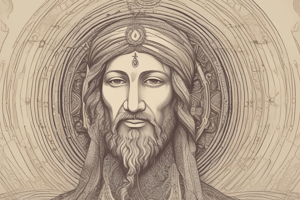Podcast
Questions and Answers
What is the main focus of Al Farabi's theory of emanation?
What is the main focus of Al Farabi's theory of emanation?
- The ethical behavior of philosophers
- The relationship between mathematics and philosophy
- The origins of the universe (correct)
- The structure of the ideal city
Which group is known for operating in secrecy and producing 52 epistles covering various subjects?
Which group is known for operating in secrecy and producing 52 epistles covering various subjects?
- Philosophers of the Virtuous City
- Brethren of Sincerity (correct)
- Al Farabi
- Al-Razi
Al-Razi is notable for rejecting religion in favor of which field?
Al-Razi is notable for rejecting religion in favor of which field?
- Ethics
- Mathematics
- Philosophy (correct)
- Metaphysics
Why was Al Farabi referred to as 'the Second Teacher'?
Why was Al Farabi referred to as 'the Second Teacher'?
What was one of the primary beliefs of the Brethren of Sincerity regarding mathematics?
What was one of the primary beliefs of the Brethren of Sincerity regarding mathematics?
What was the primary goal of Arab-Islamic philosophy during the early Abbasid period?
What was the primary goal of Arab-Islamic philosophy during the early Abbasid period?
Which location served as a significant center for translating Greek works into Arabic?
Which location served as a significant center for translating Greek works into Arabic?
Who was Hunyan ibn Ishaq primarily known for translating?
Who was Hunyan ibn Ishaq primarily known for translating?
Al-Kindi is recognized as which of the following?
Al-Kindi is recognized as which of the following?
What did Al-Kindi aim to explain philosophically?
What did Al-Kindi aim to explain philosophically?
What was the primary theme of the maqamat?
What was the primary theme of the maqamat?
Where was the Greek to Arabic translation movement predominantly centered?
Where was the Greek to Arabic translation movement predominantly centered?
Who is recognized as the first philosopher in Islamic history?
Who is recognized as the first philosopher in Islamic history?
What is the significance of Ibn Sina's work 'The Canon of Medicine'?
What is the significance of Ibn Sina's work 'The Canon of Medicine'?
Which poetry genre combines Arabic qasida and European folk songs?
Which poetry genre combines Arabic qasida and European folk songs?
Which mathematician is known as the 'Father of Algebra'?
Which mathematician is known as the 'Father of Algebra'?
What is the significance of Ibn al-Haytham's work in optics?
What is the significance of Ibn al-Haytham's work in optics?
Which figure is known for their contributions to surgical procedures and instruments?
Which figure is known for their contributions to surgical procedures and instruments?
What was Al-Fazari's major contribution to astronomy?
What was Al-Fazari's major contribution to astronomy?
Which scholar is associated with the systematic reliance on experimentation in scientific inquiries?
Which scholar is associated with the systematic reliance on experimentation in scientific inquiries?
What did Al-Tusi encourage rulers to invest in?
What did Al-Tusi encourage rulers to invest in?
Who is identified as the first to describe pulmonary circulation of the blood?
Who is identified as the first to describe pulmonary circulation of the blood?
What field did Ibn al-Jazzar primarily specialize in?
What field did Ibn al-Jazzar primarily specialize in?
Which philosopher rejected religion in favor of a metaphysical system based on five principles?
Which philosopher rejected religion in favor of a metaphysical system based on five principles?
What is the primary distinction made by al-Ghazzali regarding Greco-Arab philosophy?
What is the primary distinction made by al-Ghazzali regarding Greco-Arab philosophy?
Which philosopher is known as the commentator for his detailed analyses of Aristotle's works?
Which philosopher is known as the commentator for his detailed analyses of Aristotle's works?
What did the traditionalists in Muslim theology primarily focus on?
What did the traditionalists in Muslim theology primarily focus on?
Which work did Ibn Tufayl write to explore the interplay between reason and religion?
Which work did Ibn Tufayl write to explore the interplay between reason and religion?
What type of philosophy did al-Suhrawardi establish?
What type of philosophy did al-Suhrawardi establish?
What was the primary contribution of al-Khawarizmi in the field of science?
What was the primary contribution of al-Khawarizmi in the field of science?
Which philosophical stance did the rationalists in Muslim theology adopt?
Which philosophical stance did the rationalists in Muslim theology adopt?
Which philosopher wrote 'Tahafut al-Tahafut', challenging al-Ghazzali's critiques?
Which philosopher wrote 'Tahafut al-Tahafut', challenging al-Ghazzali's critiques?
Who is recognized for contributing to mathematics along with philosophy, as well as being a poet?
Who is recognized for contributing to mathematics along with philosophy, as well as being a poet?
Flashcards
Falsafa
Falsafa
The philosophical movement in the early Abbasid period, involving the study and commentary on Greek philosophical sources by Arab and Muslim thinkers.
House of Wisdom
House of Wisdom
A major center of translation in Baghdad during the Abbasid period, where Greek works were translated into Arabic.
Al-Kindi
Al-Kindi
Known as 'The Philosopher of Arabs', Al-Kindi was an early Muslim philosopher who attempted to reconcile the Quran and Greek philosophy.
Reconciliation of Greek Philosophy and Islam
Reconciliation of Greek Philosophy and Islam
Signup and view all the flashcards
Translation Movement
Translation Movement
Signup and view all the flashcards
Al-Farabi's Philosophy
Al-Farabi's Philosophy
Signup and view all the flashcards
Al-Farabi's Legacy
Al-Farabi's Legacy
Signup and view all the flashcards
Brethren of Sincerity
Brethren of Sincerity
Signup and view all the flashcards
Importance of Mathematics
Importance of Mathematics
Signup and view all the flashcards
Al-Razi's Philosophical Stand
Al-Razi's Philosophical Stand
Signup and view all the flashcards
Who is Avicenna?
Who is Avicenna?
Signup and view all the flashcards
Ibn Sina's philosophical system
Ibn Sina's philosophical system
Signup and view all the flashcards
Traditionalists in Muslim theology
Traditionalists in Muslim theology
Signup and view all the flashcards
Rationalists in Muslim theology
Rationalists in Muslim theology
Signup and view all the flashcards
Al-Ghazzali's 'Incoherence of the Philosophers'
Al-Ghazzali's 'Incoherence of the Philosophers'
Signup and view all the flashcards
Two types of Greco-Arab philosophy
Two types of Greco-Arab philosophy
Signup and view all the flashcards
Ibn Rushd's response to Al-Ghazzali
Ibn Rushd's response to Al-Ghazzali
Signup and view all the flashcards
Ibn Tufayl's "Hay bin Yaqzan"
Ibn Tufayl's "Hay bin Yaqzan"
Signup and view all the flashcards
Al-Suhrawardi's illuminationist philosophy
Al-Suhrawardi's illuminationist philosophy
Signup and view all the flashcards
Why is Arabic science called Arabic science?
Why is Arabic science called Arabic science?
Signup and view all the flashcards
Who was Al?
Who was Al?
Signup and view all the flashcards
What is the Maqamat?
What is the Maqamat?
Signup and view all the flashcards
What was Al-Razi's approach to philosophy?
What was Al-Razi's approach to philosophy?
Signup and view all the flashcards
What did Al-Jahiz write about?
What did Al-Jahiz write about?
Signup and view all the flashcards
What was Ibn al-Nafis's contribution?
What was Ibn al-Nafis's contribution?
Signup and view all the flashcards
Who is considered the 'Father of Algebra'?
Who is considered the 'Father of Algebra'?
Signup and view all the flashcards
What is significant about al-Khwarizmi's work 'Kitab al-jabr wa al-Muqabala'?
What is significant about al-Khwarizmi's work 'Kitab al-jabr wa al-Muqabala'?
Signup and view all the flashcards
Why was astronomy important to the Arabs?
Why was astronomy important to the Arabs?
Signup and view all the flashcards
Who is known as the most influential Muslim figure in astronomy?
Who is known as the most influential Muslim figure in astronomy?
Signup and view all the flashcards
What was al-Fazari's major contribution to Islamic astronomy?
What was al-Fazari's major contribution to Islamic astronomy?
Signup and view all the flashcards
Who is considered the 'father of modern surgery' and why?
Who is considered the 'father of modern surgery' and why?
Signup and view all the flashcards
What was Ibn al-Haytham's main contribution to science?
What was Ibn al-Haytham's main contribution to science?
Signup and view all the flashcards
What is Ibn al-Nafis known for?
What is Ibn al-Nafis known for?
Signup and view all the flashcards
Study Notes
Early Abbasid Baghdad - The Golden Age of Arabic Learning
- Falsafa relied on translating and studying Greek philosophical texts, bridging Arab and mainstream cultures.
- Reconciled Greek ethical and social principles with Islamic perspectives.
- Baghdad's House of Wisdom was a major translation center, translating Greek works into Arabic.
- Toledo, Spain was another significant translation center, translating from Arabic to Latin.
Translation Movement
- Hunayn ibn Ishaq and his students translated numerous works from Galen, Plato, and Aristotle.
- Hunayn ibn Ishaq's translations exceeded 31 texts.
Philosophy
- Al-Kindi, "The Philosopher of Arabs," aimed to reconcile the Quran with Greek philosophy.
- Explored the creation of the world, divine revelation, resurrection, and the ultimate destruction.
- Remained committed to Islam while engaging in philosophy.
- Established a school of Neoplatonism.
Al-Farabi
- Influenced by Neoplatonism.
- Known as the "Second Teacher" (after Aristotle).
- Attempted to reconcile religion and philosophy.
- Developed a theory of emanation regarding the origin of the world.
- Authored numerous works, including 43 on logic, 17 on music, and 7 each on ethics and politics.
Brethren of Sincerity ("Ikhwan al-Safa")
- Dedicated to knowledge and operated in secret.
- Covered a wide range of subjects including mathematics, ethics and philosophy.
- Considered very tolerant.
Al-Razi
- Important philosopher and medical figure
- Initially rejected religion but later saw a connection between philosophy and the soul.
- Wrote the comprehensive book on medicine "al-Hawi."
Sina ("Avicenna")
- Wrote "Canon of Medicine" and "The Book of Healing."
- Influenced by Aristotle and Neoplatonism.
- One of the most famous Muslim philosophers.
Muslim Theologian and Philosophy
- Muslim theology studied God's role in the world's creation.
- Traditionalists focused on religious texts, and rationalists used reason and philosophy alongside religious texts.
- Muslims sometimes challenged philosophy, seeing it as potentially conflicting with religious teachings.
Al-Ghazzali
- Wrote "The Incoherence of Philosophers" to critique philosophical ideas considered incompatible with religious truths.
Ibn Rushd ("Averroes")
- Known as a commentator on Aristotle's works.
- Refuted the criticisms of al-Ghazzali.
- Wrote "The Incoherence of the Incoherence."
- Many of his translations were done by Jewish scholars in Al-Andalus (Spain).
Ibn Tufayl
- Authored the philosophical novel "Hay bin Yaqzan."
- Demonstrated the possibility of reaching religious truths through reason and intellect.
Al-Suhrawardi
- Founder of illuminationist philosophy and mysticism.
- Known as "Master of Illumination."
- Combined philosophy and mysticism.
Science
- Al-Khwarizmi made significant advancements in algebra.
- Arab scientists built upon Greek knowledge, especially in astronomy and mathematics.
Ibn al-Haytham
- Wrote "The Book of Optics."
- Advanced understanding of light, vision, and lenses.
- Employed scientific experimentation and methodology.
Zahrawi
- Considered the "Father of Modern Surgery."
- Wrote "Kitab al-Tasrif," a significant surgical text.
Ibn al-Jazzar and Al-Nafis
- Major medical practitioners.
- Ibn al-Jazzar wrote on child care, medicine, and diet.
- Al-Nafis described the pulmonary circulation of blood, a key development in physiology.
Additional Notes
- Baghdad, Cairo, Damascus, and Maragha were centers of medical and astronomical learning.
- Arabs valued astronomy for practical reasons such as prayer times, observing the moon, and determining the direction of prayer.
- Key figures in astronomy include Al-Tusi, who contributed to the advancements in geometrical models.
Studying That Suits You
Use AI to generate personalized quizzes and flashcards to suit your learning preferences.





